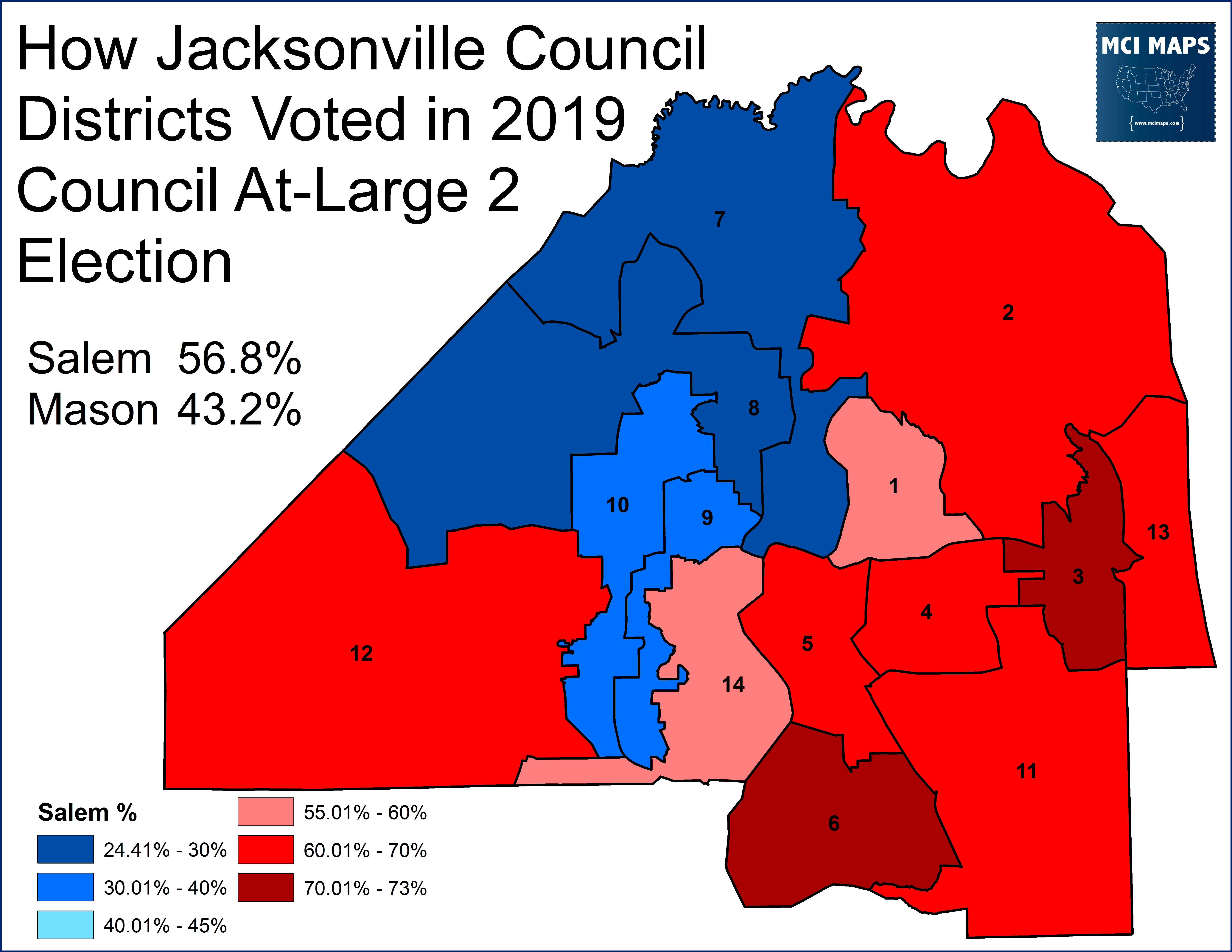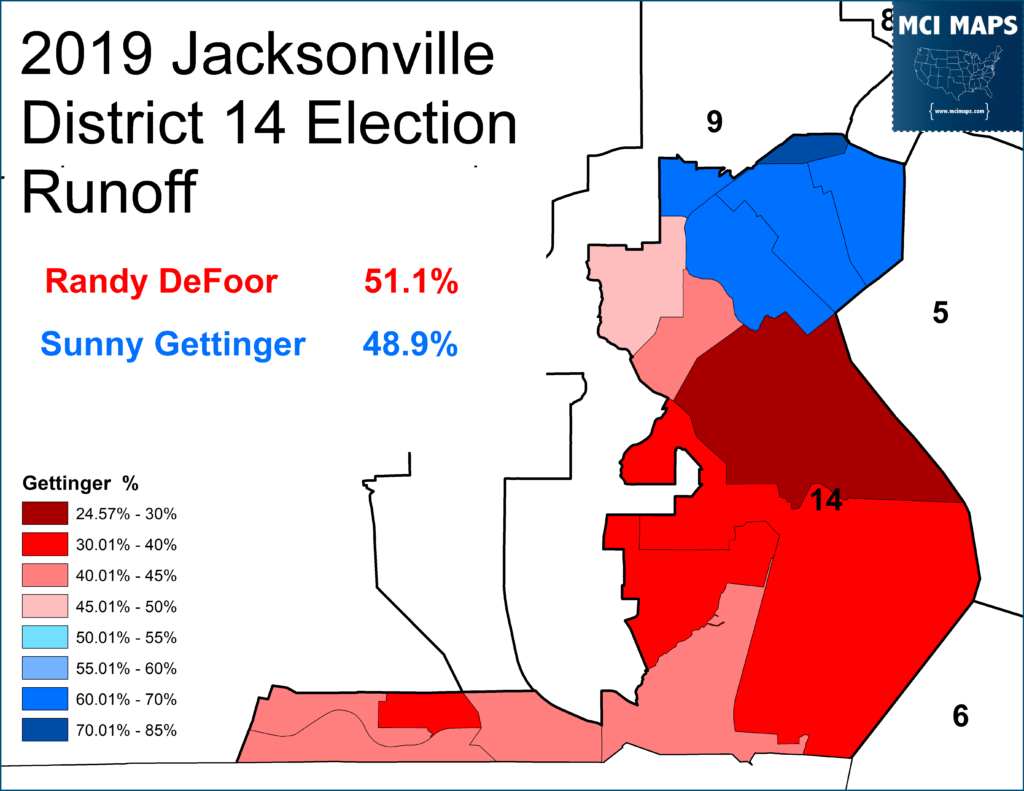Last night, Jacksonville (which is the entire county of Duval) had its municipal elections. To sum it up, they were a disaster for Democrats. Despite voting for 3 out of 5 statewide Democrats in 2018 – Andrew Gillum, Bill Nelson, and Nikki Fried – the county saw the local party lose seats or fail at pickup opportunities. So how did this happen?
Background
Duval is large urban county of over 900,000 residents. It holds its council and officer elections in the spring every four years. Thanks to consolidation, the entire county is also the City of Jacksonville. The entire 19 member council (made up of 5 at-large seats and 14 single-member districts), Mayor, and constitutional officers were up. Elections in Duval are partisan and done in a Louisiana-style jungle primary. Everyone runs on one ballot, and if no one gets 50%, a runoff is held.
Jacksonville has often leaned to the right of Florida. Obama aimed to win it twice but came up short both times. However, Democrats have scored local wins and in 2011 Alvin Brown, an African-American Democrat, was elected Mayor. Democrats can win in Duval by getting the county’s large African-American population to the polls and winning over white liberals and moderate suburbs. Brown narrowly lost re-election in 2015 to a right-of-center Republican; Lenny Curry. I wrote about that race here and here. Read there if you want more backstory on Jacksonville.
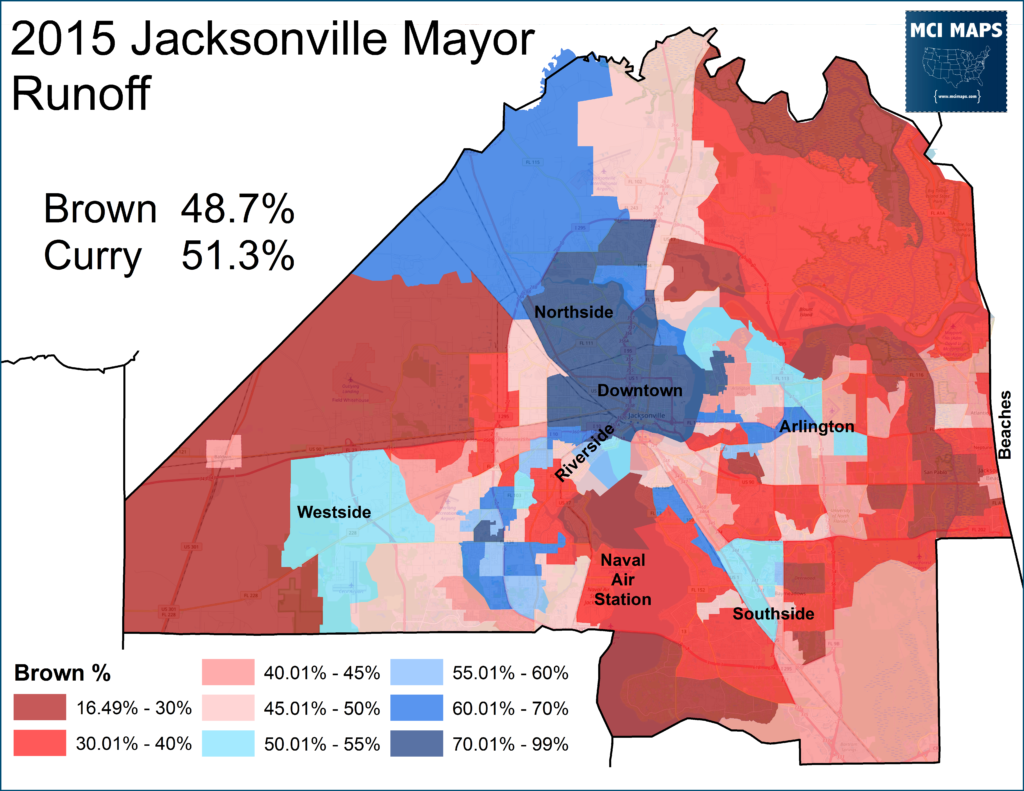
That same night, Democrat Tommy Hazouri won a city council seat against a much more conservative Republican.
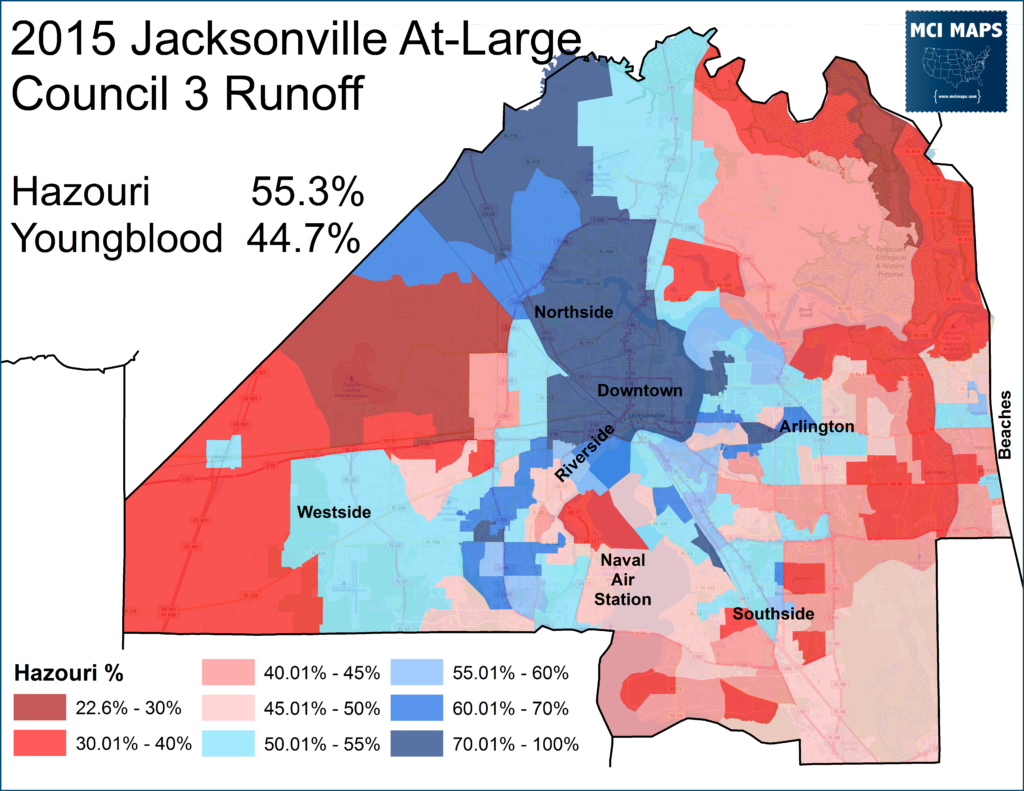
Local party dynamics in Jacksonville can get very complex. Democrats are divided between socially conservative black churches and liberal Riverside whites while Republicans divide on business-friendly moderates and social conservatives. Brown was from the more conservative wing of the party and there was a good degree of tension in the party over his lack of support for a Human Right’s Ordinance.
Local party politics aside, Duval has long been a close but modestly GOP area. Hillary Clinton nearly took Duval in 2016 thanks to swings in white suburban voting and then in 2018 the county swung further to left and backed several statewide Democrats.
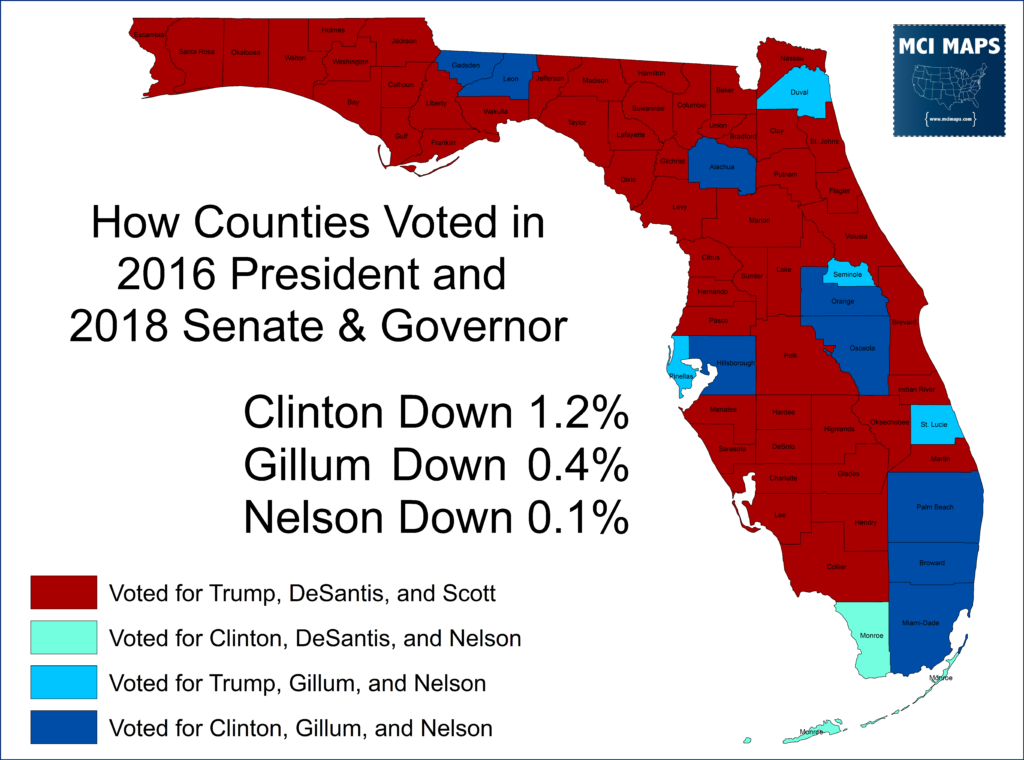
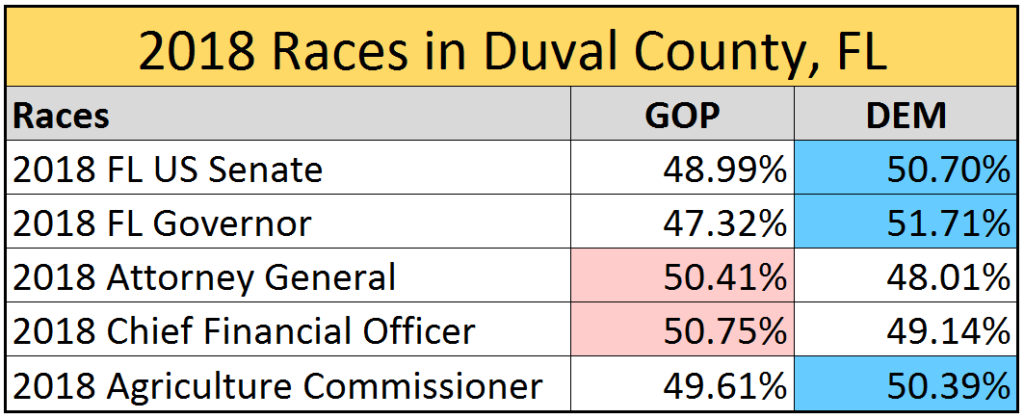
After these wins, local Democrats were encouraged for 2019. The hope was to take back the Mayor position and make gains on the city council. Heading into the election, democrats only held 5 of the 14 single-member districts and 2 of the 5 at-large seats. They also held no constitutional officers (Clerk of Courts, Supervisor of Elections, Sheriff, Tax Collector, or Property Appraiser).
City Council Districts
Democrats only had a few good opportunities for the city council single-member districts. The current map has many flaws. It packs in African-Americans into four districts. Proposed changes have been opposed by some African-Americans and several Republicans; resulting in attempts for more compact maps failing.
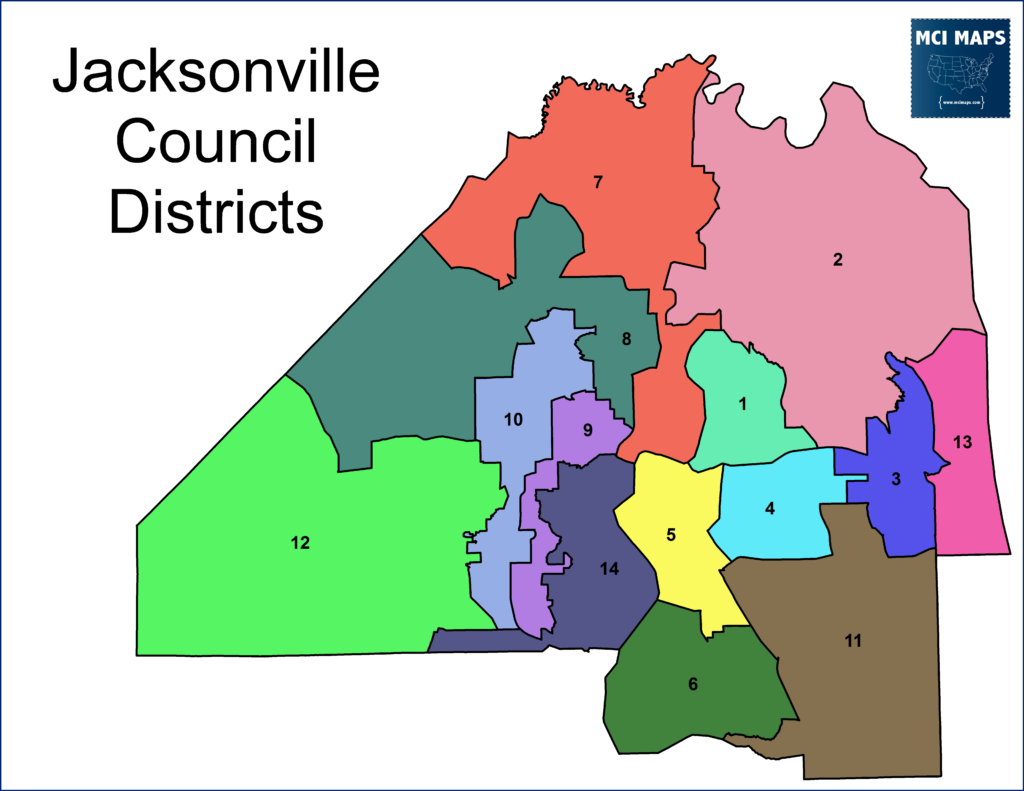
As a result of the current map, only 5 of the 14 single-member districts are Democratic. Their average vote share in the five statewide races of 2018 is below.
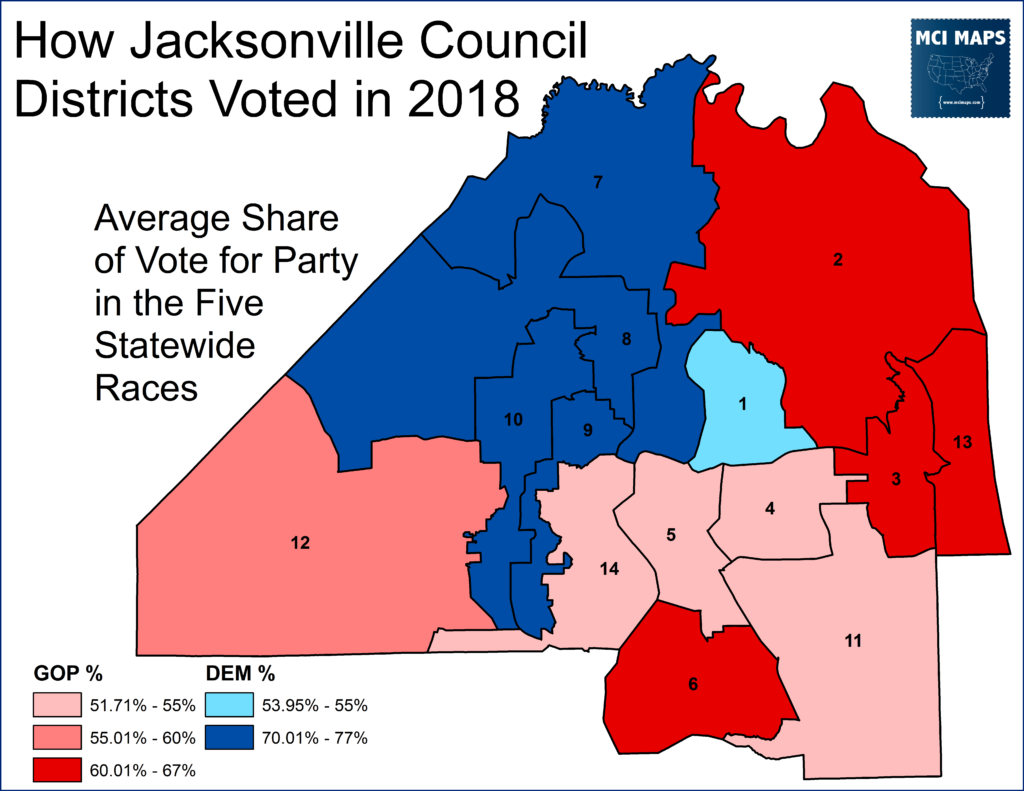
Five of the districts backed all the democrats running while Andrew Gillum won the 14th district as well.
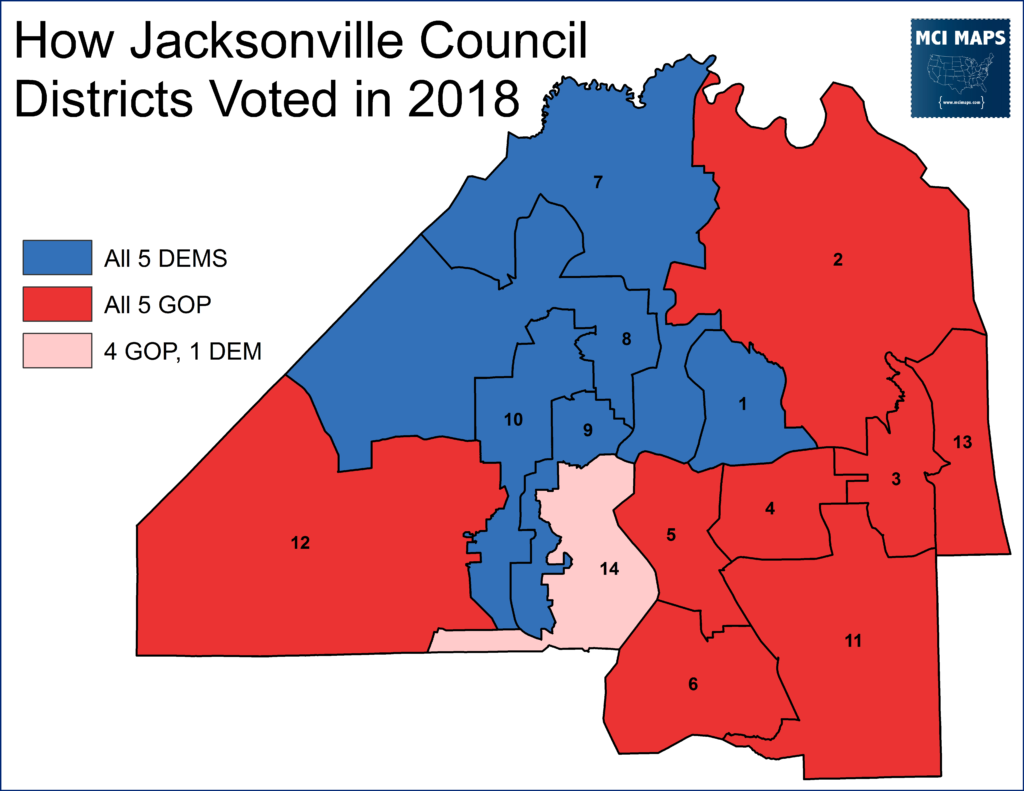
Heading into 2019, Democrats were focused more on city-wide races.
2019 Election Failings
Democrats made a fatal mistake heading into 2019 – they had no candidate for Mayor. Lenny Curry appeared tough to beat, having amassed a huge war chest and being on good terms with several Democrats on the council.
Opposition to Curry was more personal than ideological. Two council-members considered challenging Curry, planning to double-team him and drag him into a runoff. Democrat Garrett Dennis and Republican Anna Brosche were the two considering this plan. Dennis was from a safe African-American district while Brosche had won an at-large seat in 2015 by ousting Kim Daniels, the worst Democrat in Florida.
The local party did NOT take a proactive role in finding a strong recruit against Curry. Focus was more on down-ballot races they believed they could win. Then, during the week of qualifying, Dennis decided to run for re-election in his district and not run for Mayor. Brosche went forward to challenge Curry. Democrats didn’t run a single candidate for Mayor, in the end leaving Curry to face off against Brosche and a few other Republicans.
Democrats argued they could focus their resources on other offices. However, they missed one crucial detail – turnout is driven by the Mayoral election. Jacksonville Mayor is a very powerful and high-profile office. The lack of a Democratic candidate gave Democrats less reason to show up. Meanwhile, Curry was in the middle of a fight with another Republican and had millions of dollars to spend on the race. Democrats passed resolutions opposing Curry (and informally making Brosche their pick) – but this would not inspire folks to show up.
As early and absentee voting began, the problem became apparent. Democrats badly lagged in vote by mail returns and only took the lead for in-person early voting on the last day. Election Day wound up being heavily Republican and the result was a 48% Republican 42% Democratic electorate. Compared to the 40% Dem 36% GOP registration, this was a 10 point swing! Democrats made up a larger share of the vote 3 of the last 4 municipal elections – and never had they been so far behind. Even before votes were released, it was clear the night would be a disaster.
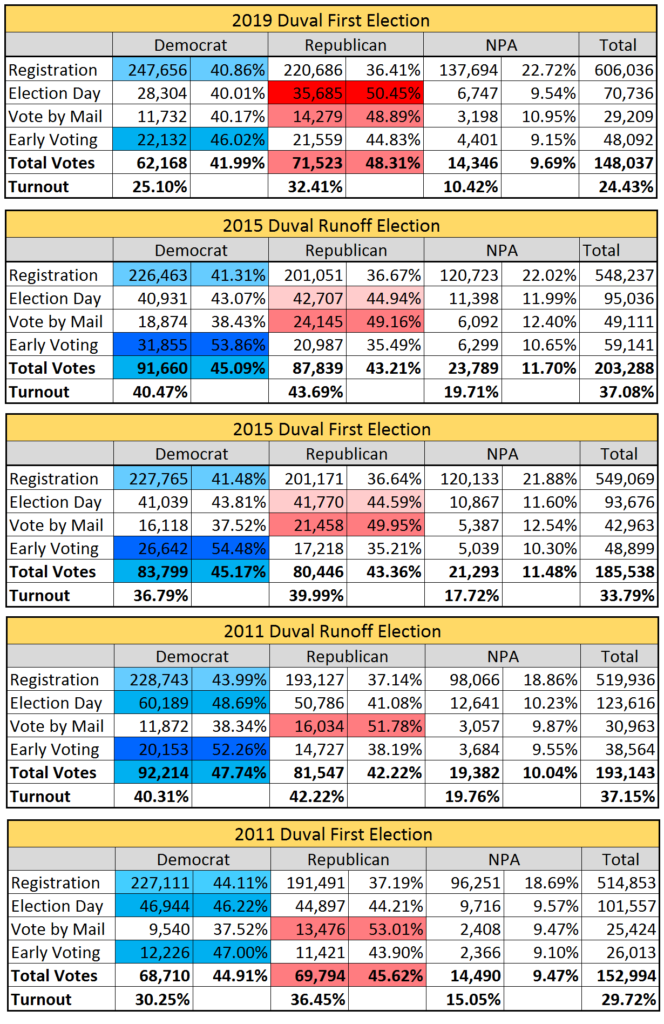
Election Results
Mayor went as many expected. Brosche never could compete with Curry’s money or institutional support and she lost badly. She only won in the heavily African-American precincts of Northside and Downtown; and in some of white/liberal Riverside.
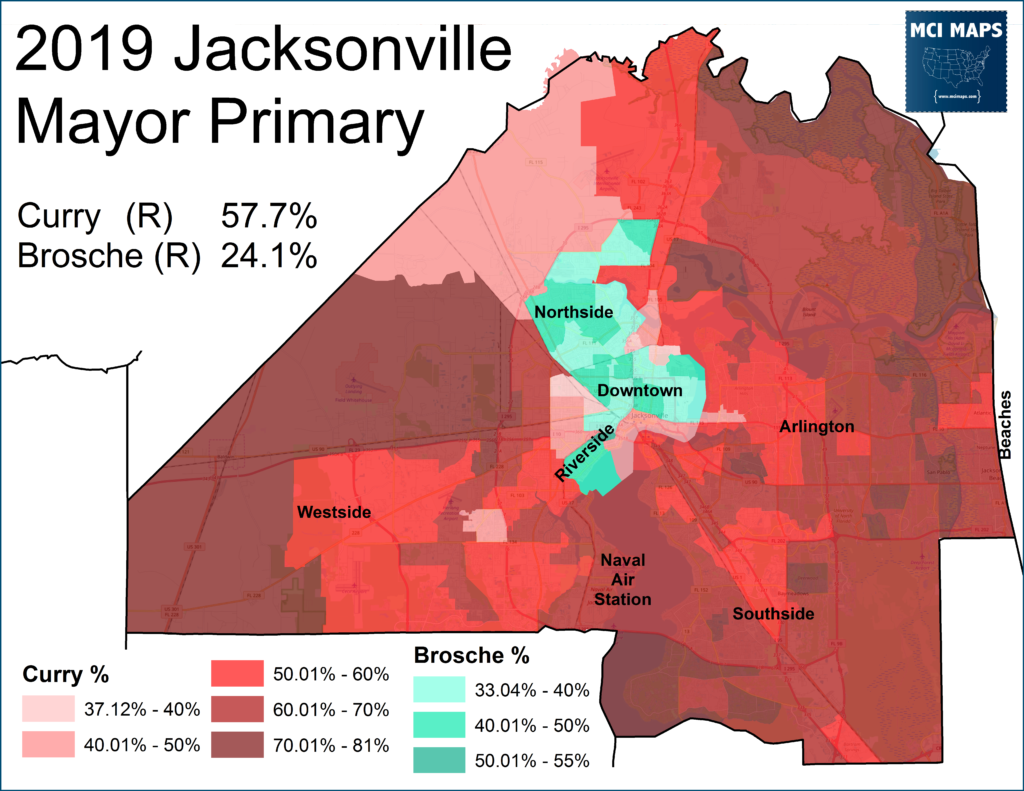
Despite winning some black communities. she won zero of the council districts.
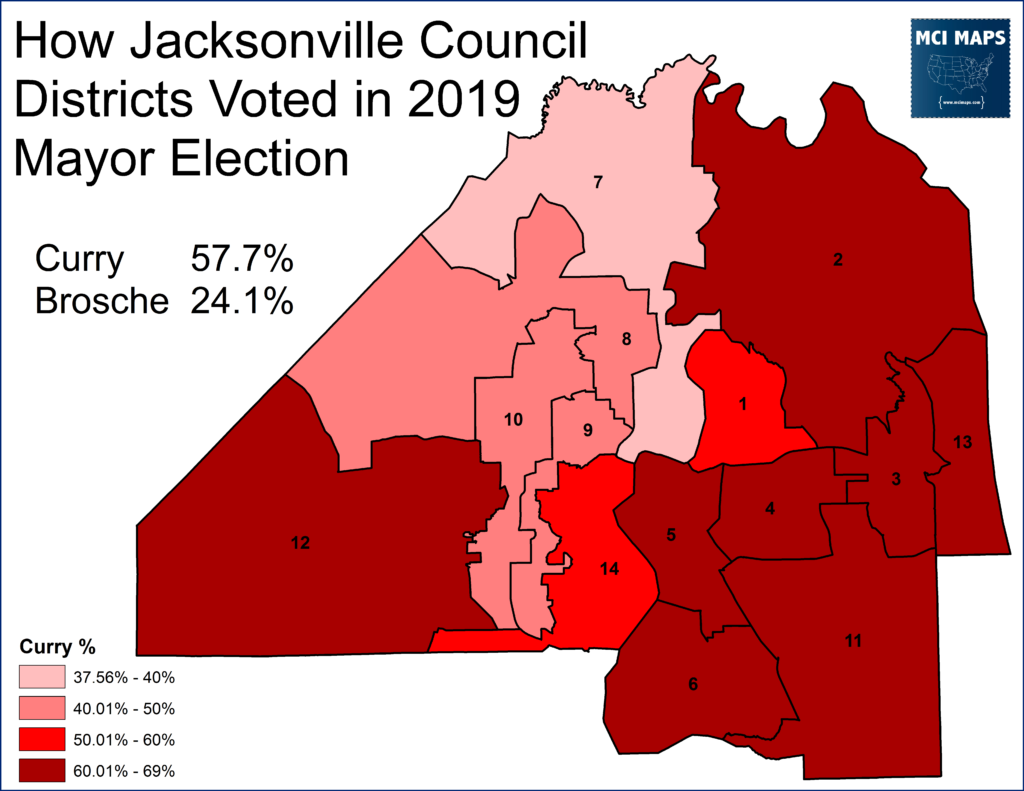
The constitutional officer that Democrats had the greatest hope for was Tax Collector. John Crescimbeni was an at-large commissioner and a solid Democratic recruit for the office. However, the bad turnout sank his bid against Overton.
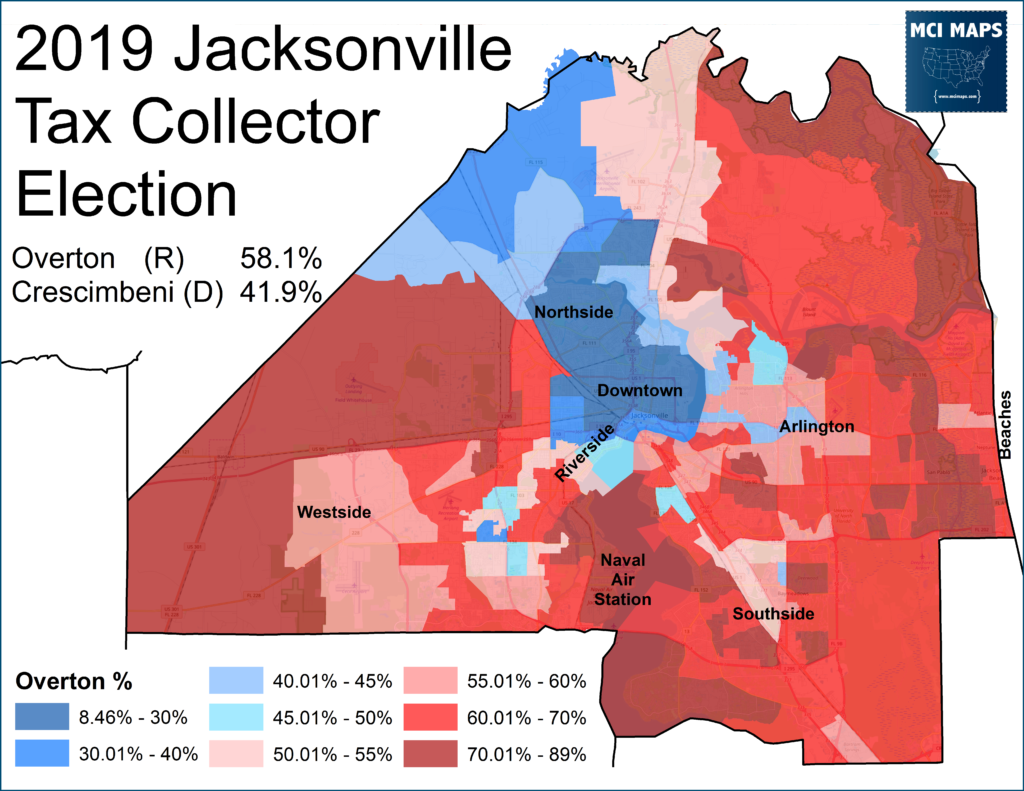
Overton had just become Tax Collector in 2018 in a special election. He had slipped into 2nd in the 2018 jungle primary and defeated former State Rep Mia Jones that November in a very close race.
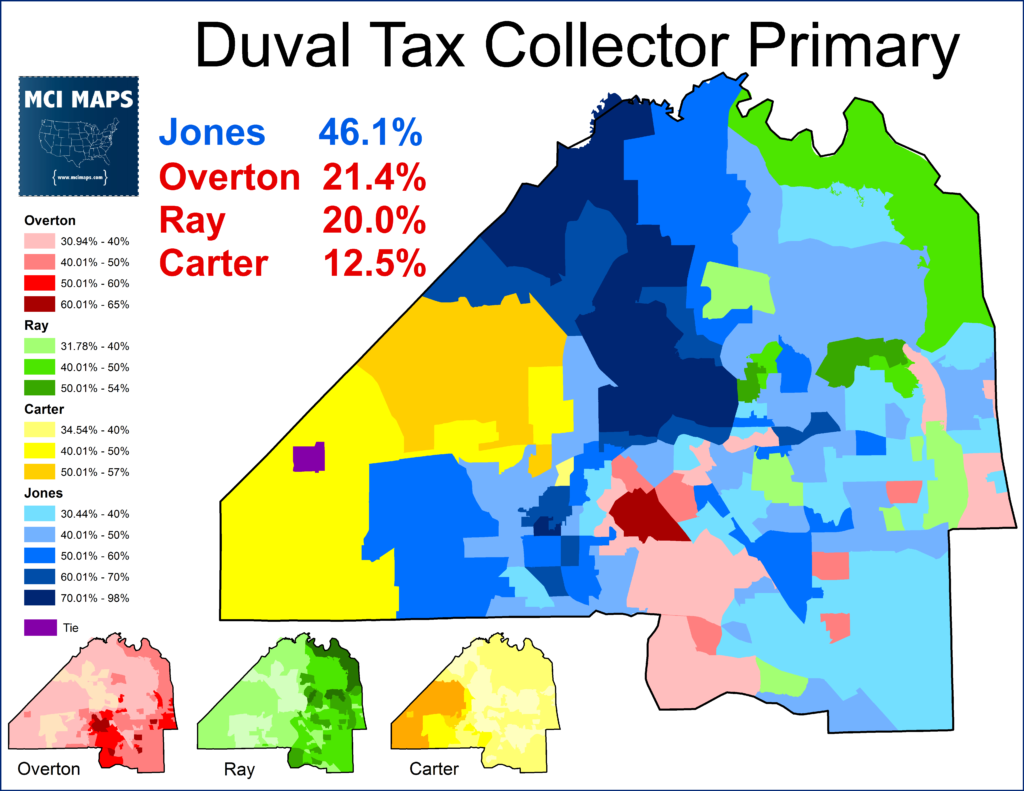
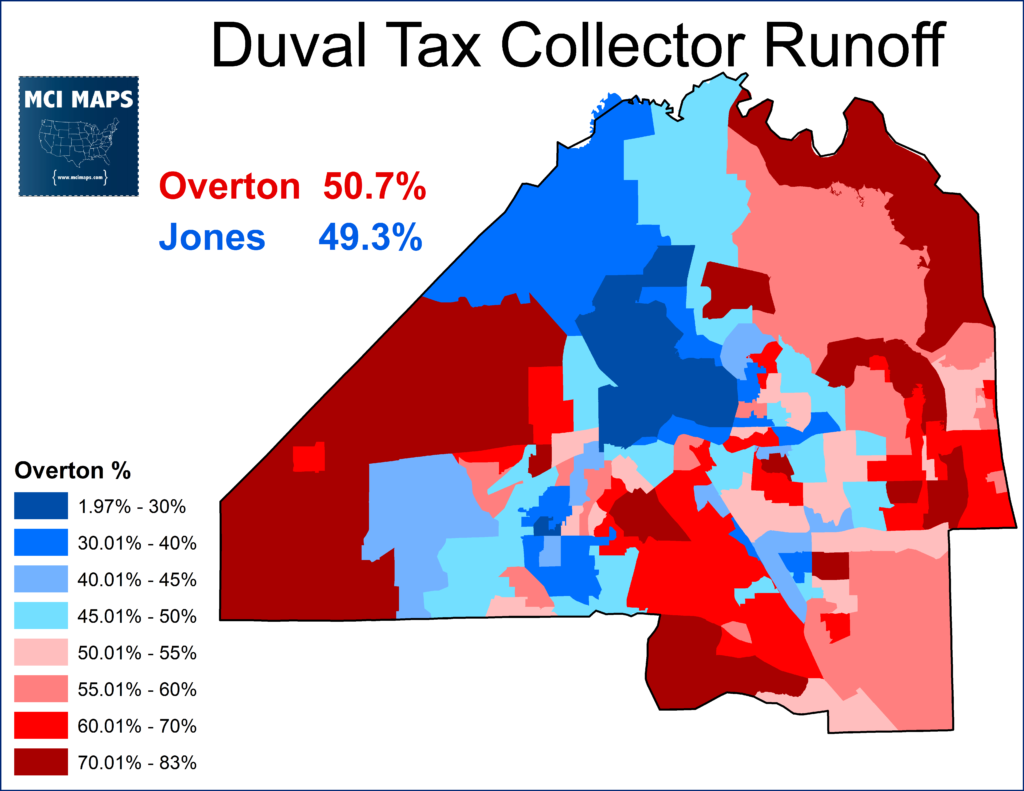
What helped Overton this time was a more Republican-leaning electorate. In November of 2018, that electorate was 42.6% GOP and 41% Democrat – not nearly as bad as the 48-42 split this time. This election comparison perfectly highlights the effect of turnout on the outcomes of these races.
The Sheriff’s race was another loss for Democrats. The race didn’t even get the local focus it deserved.
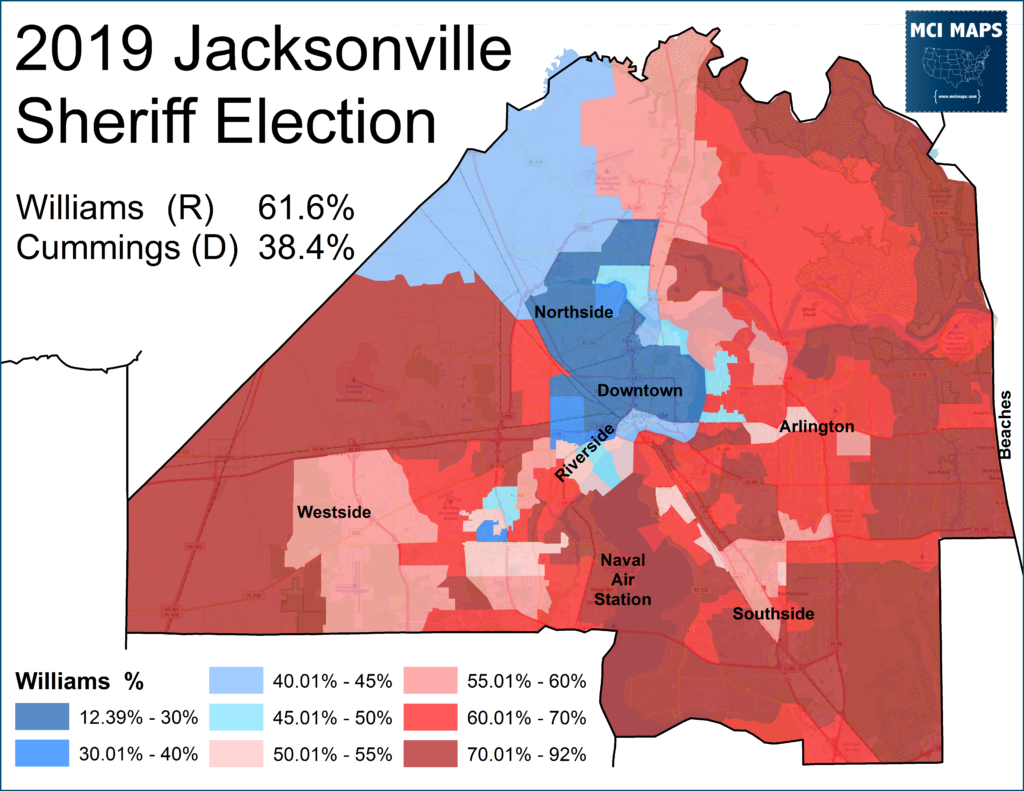
Property Appraiser was the biggest blowout, with the Democrat only really winning in African-American precincts.
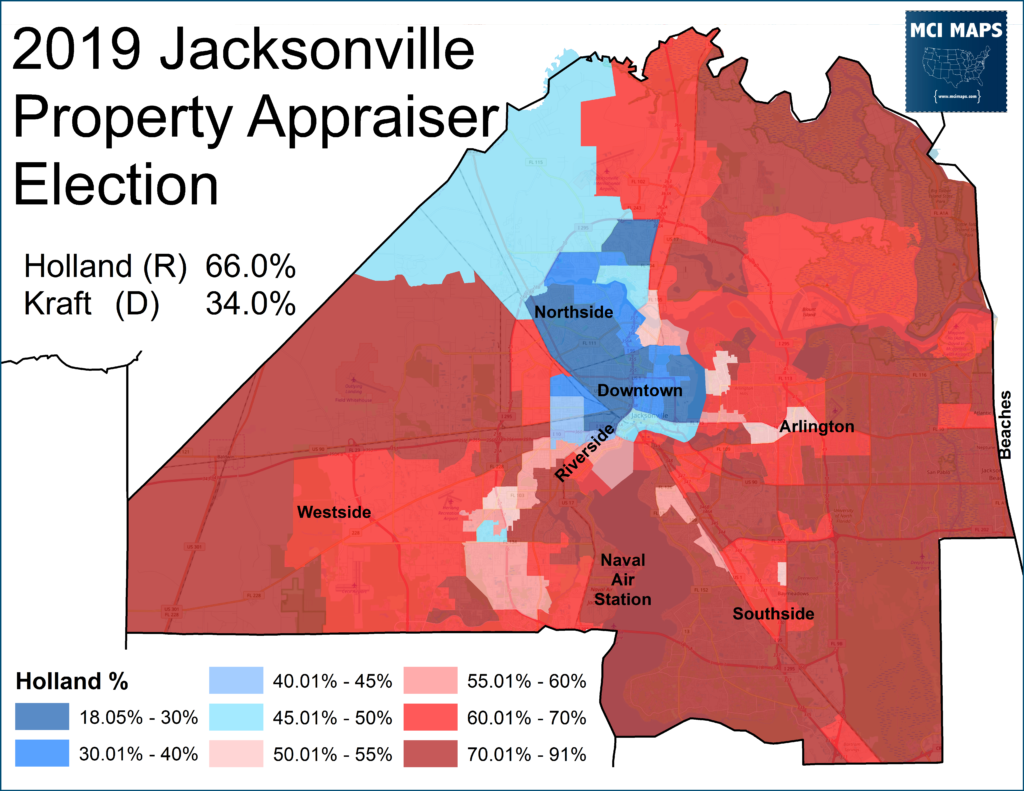
Democrats lost control of at-large district 2, which had been held by John Crescimbeni. Despite being heavily outspent, Darren Mason made a good showing with 43% (yes I need to fix the map). This was better than most Democrats but still far away from victory. This was a GOP pickup.
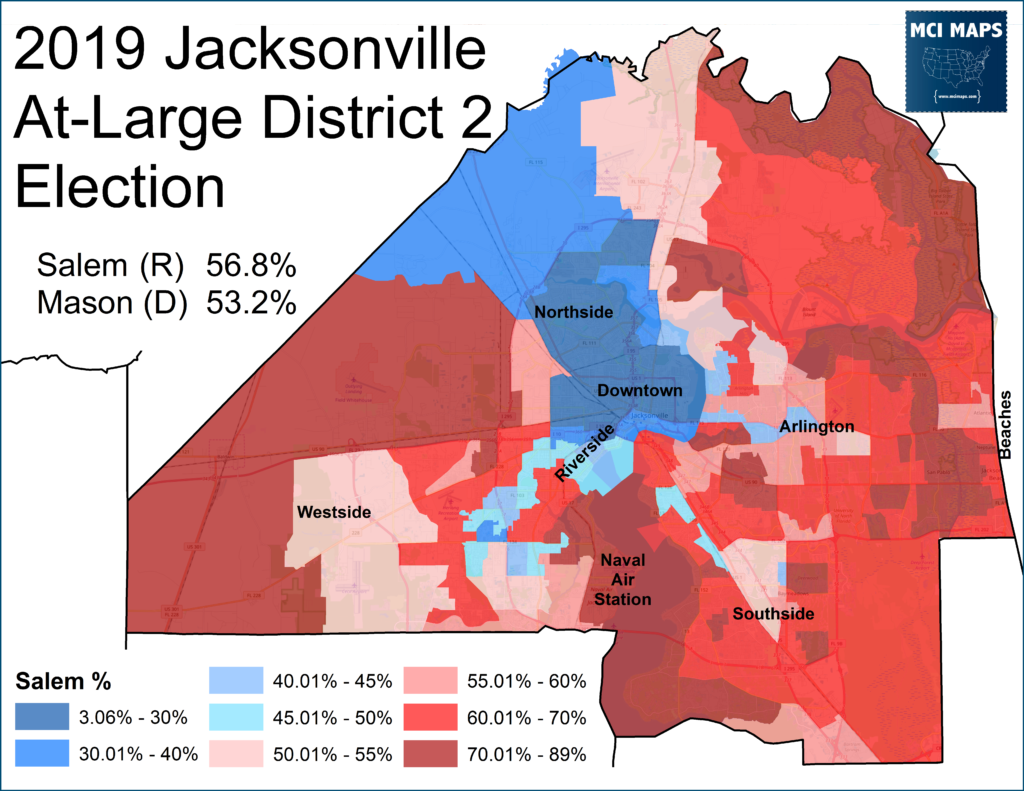
The results of that race broken down by council district show Mason only winning the solidly African-American districts. Terrible turnout also resulted in district 1 flipping red for the city-wide offices.
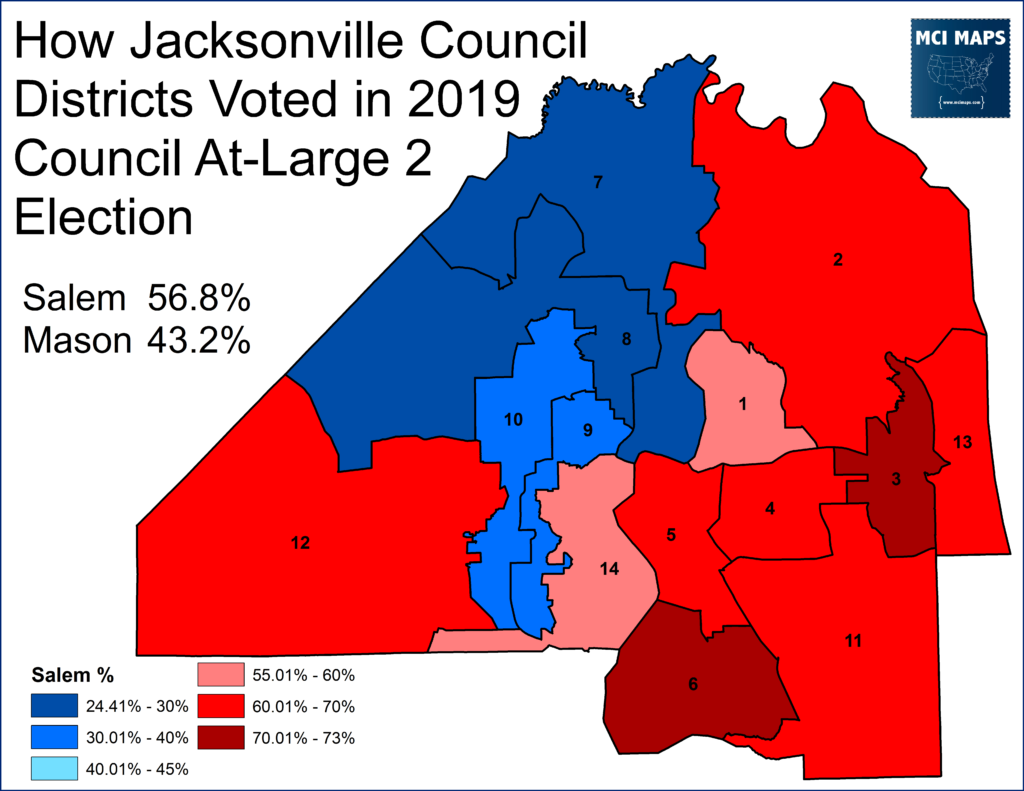
Democrats hoped to take At-Large 1, which was being vacated by Broche. Their candidate was Lisa King, the former DEC Chair. However, she will be dragged into a runoff in May. Her opponent will be Terrance Freeman, an African-American Republican who Rick Scott originally appointed to District 10 when the Incumbent was indicted. While King was far ahead, the turnout dynamic of the runoff and how Republicans unite will decide this outcome. As the 2018 Tax Collector race showed, getting close in the first round doesn’t mean you win the runoff.
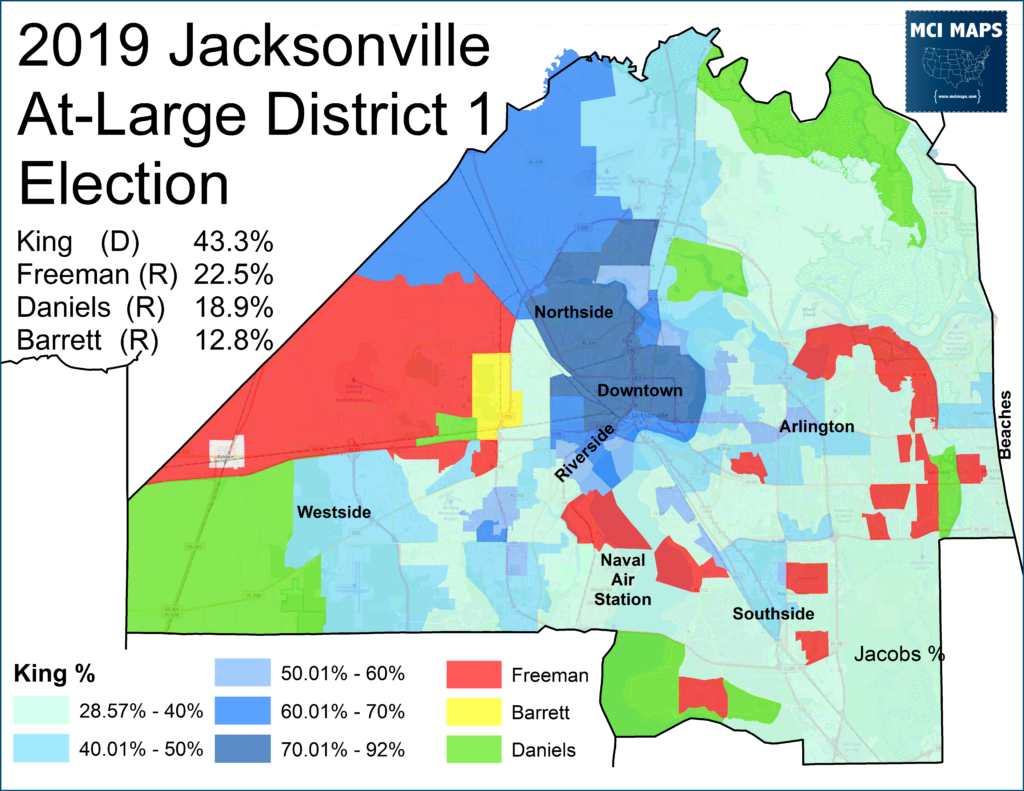
Tommy Hazouri is by far the strongest (electorally) Democrat on the council. However, thanks to a split in the Democratic vote, he is being dragged into a runoff as well. Hazouri angered many democrats by backing Curry in his re-election and Jacobs took many black democrats. The party needs to get over its infighting and unite to avoid another lost seat. A big question will be, does Curry back Hazouri as a thank you.
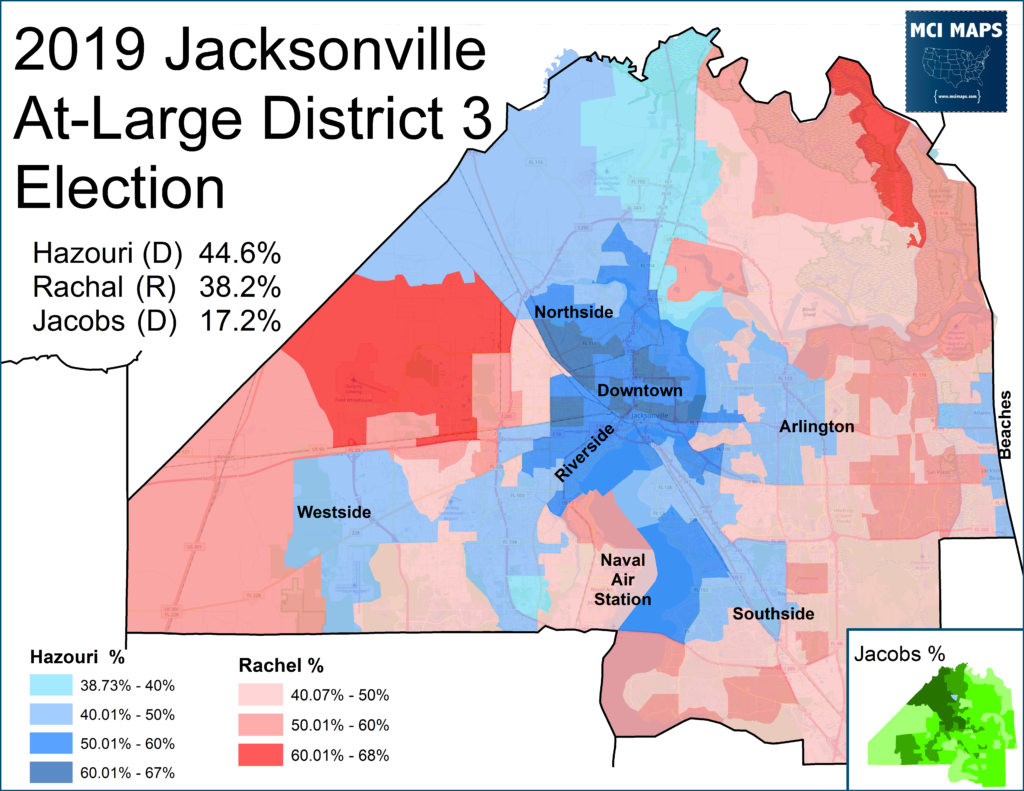
Democrats also barely held on in their district 1 defense. Democrat Joyce Morgan held off former Mayoral candidate Bill Bishop. The district backed Republicans in every countywide race, so Morgan outperformed her fellow Democratic candidates. It no doubt helped that Bishop’s role as a Curry enemy hurt him in getting institutional support he could have used to win.
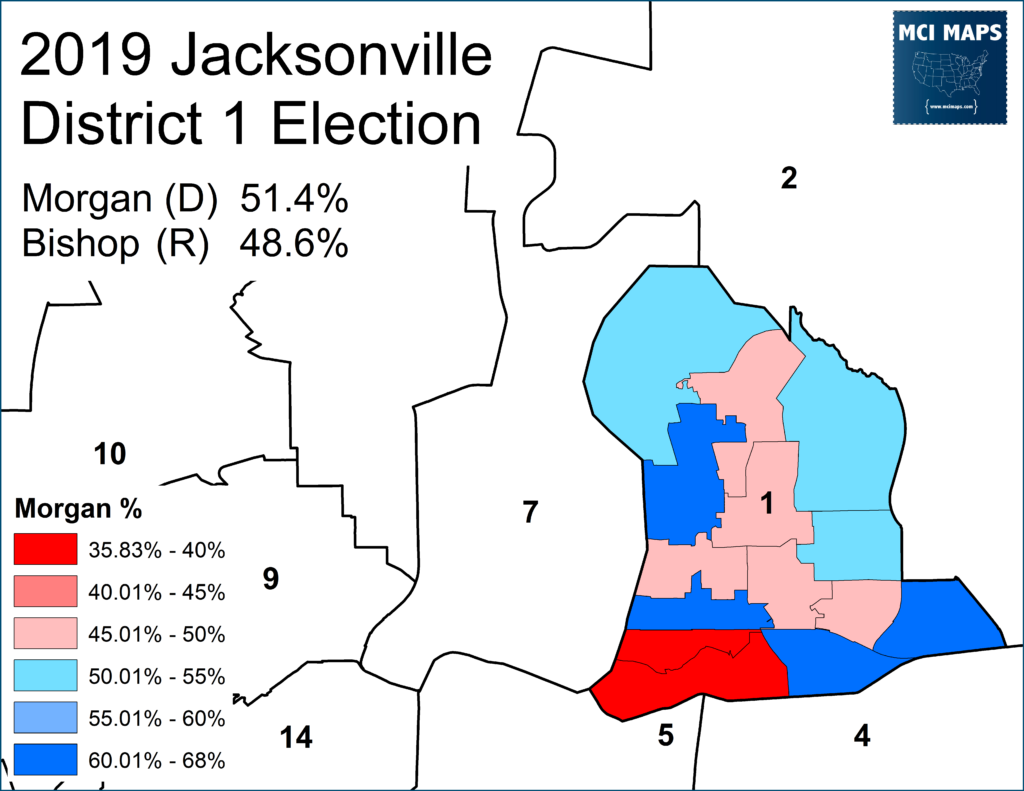
Finally, in district 14, Democrats made it into a runoff in a seat that backed Gillum but otherwise normally backs Republicans. If Democrats get a good turnout dynamic going for the runoff, maybe they can pick this seat up.
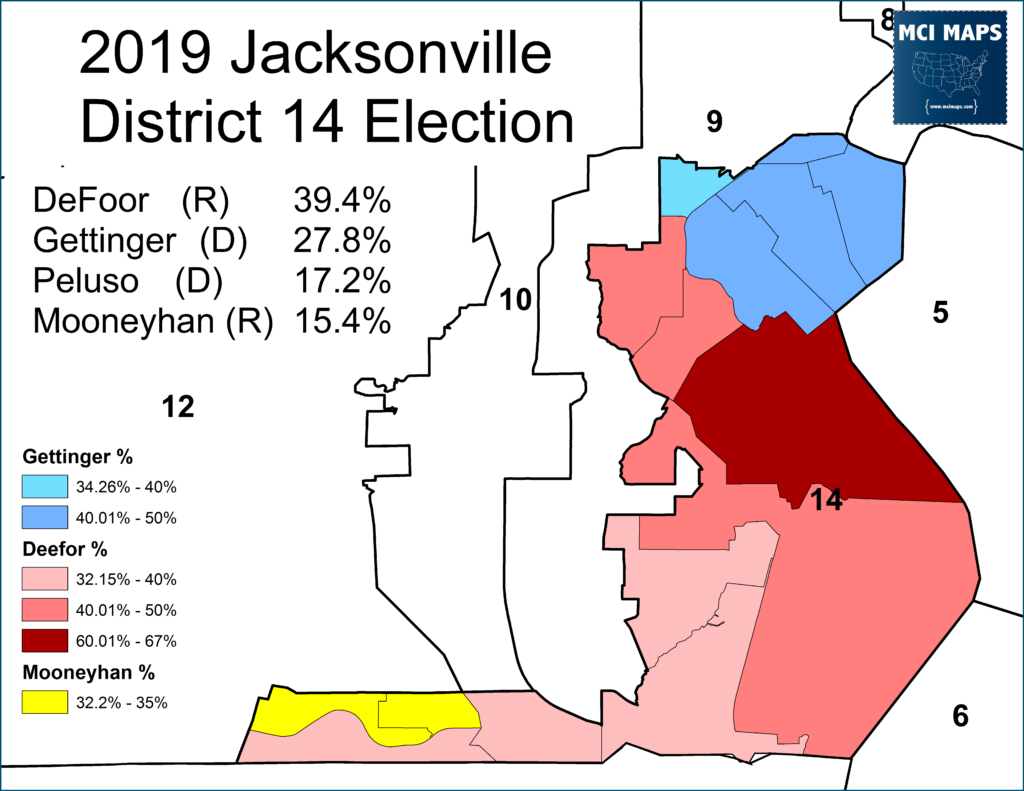
Overview and Runoffs
There is no spinning this. The results were terrible for Duval Democrats. Their goals to win council seats and constitutional officers have largely gone up in flames. They have already lost one council seat and risk another in the runoff. If the democrats sweep all three runoffs, they could end the spring with ONE extra council seat (gaining 2 but losing one). If they lose all runoffs then they will actually have lost TWO seats.
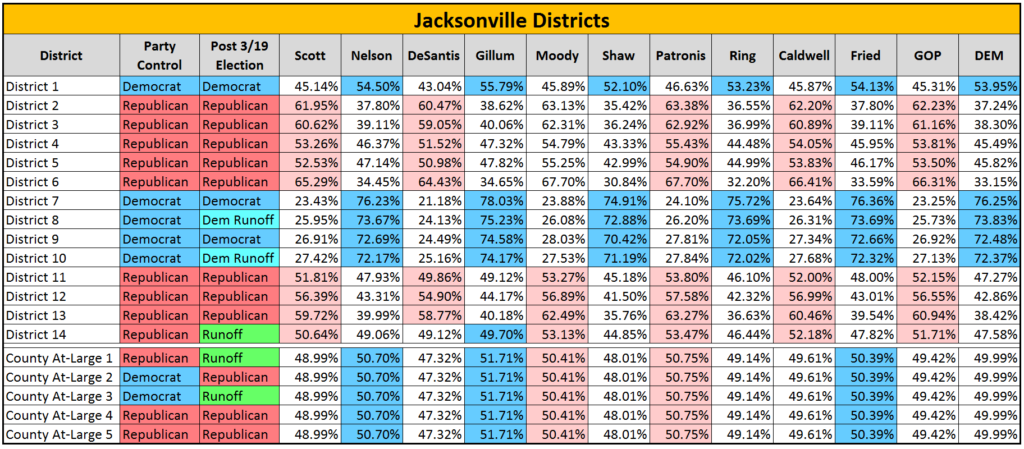
Status of the districts and their 2018 vote are seen above. They have one seat to defend (At-Large 3) and two pickup possibilities. How those races go will heavily depend on partisan makeup of the runoff electorate. Democrats have improved their share of turnout between first elections and runoffs before. However, they have ALOT of improvement to do this time around.
Runoff Update
The Jacksonville runoffs resulted in party holds for all the offices being challenged. Republicans held At-Large District 1, with Terrance Freeman defeating Lisa King.
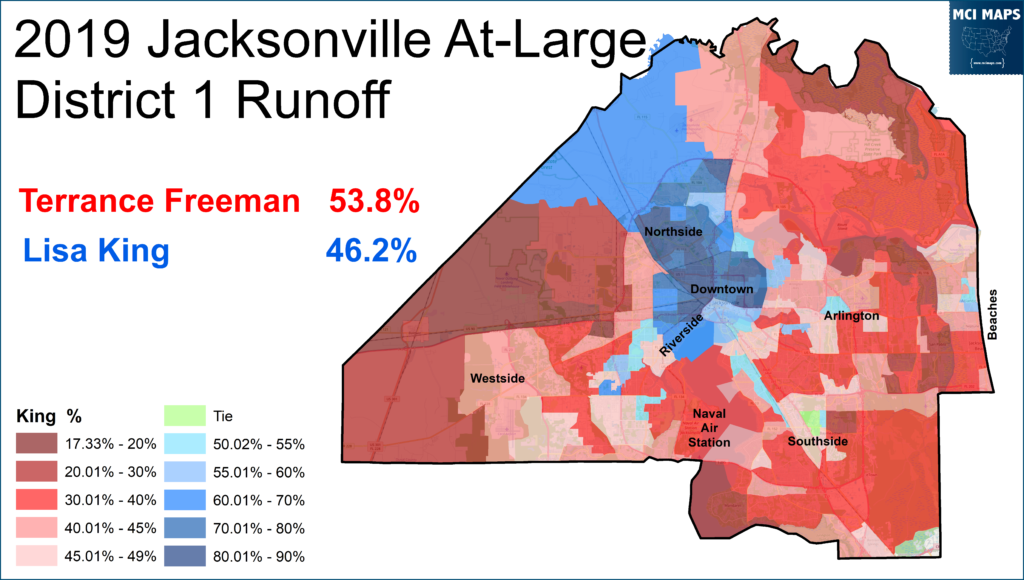
Tommy Hazouri, meanwhile, won his runoff with little issue. Republicans linked to Curry kept their word, and Hazouri secured a nice re-election.
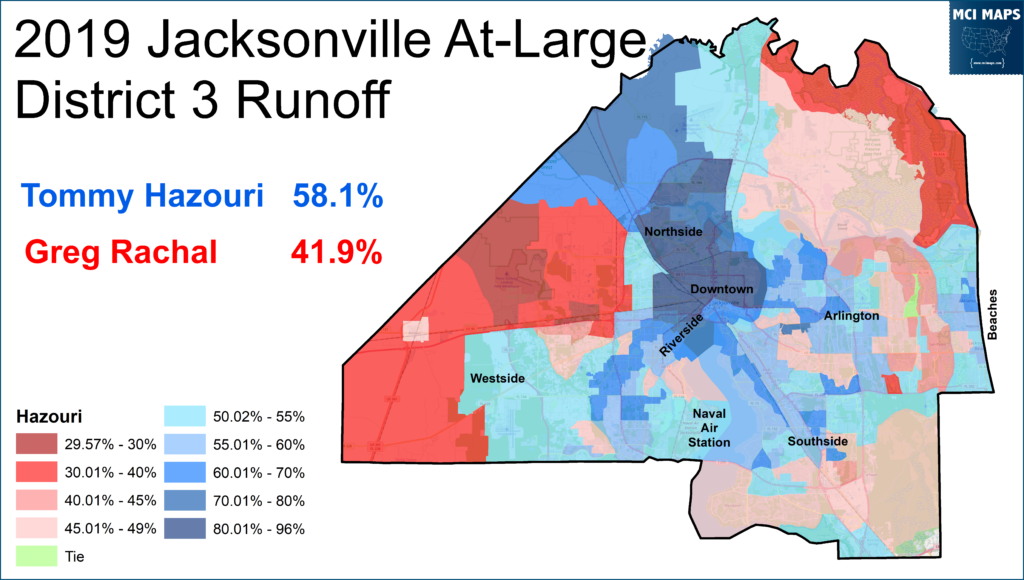
The runoff for district 14 was very close, with Democrats almost pulling off a flip by dominating along Riverside. However, Randy DeFoor secured his party’s win.
With all the races done, Democrats end the local election season down one district. A terrible showing.

